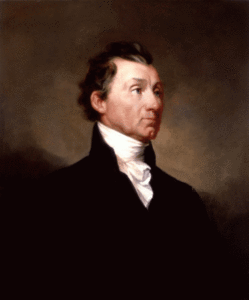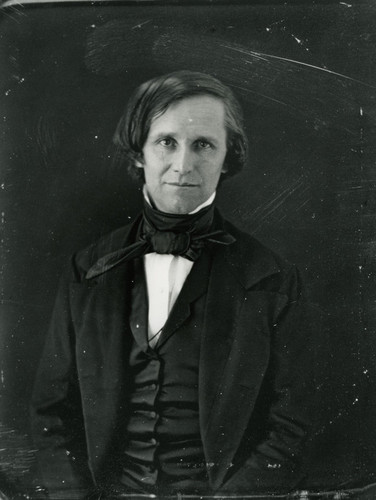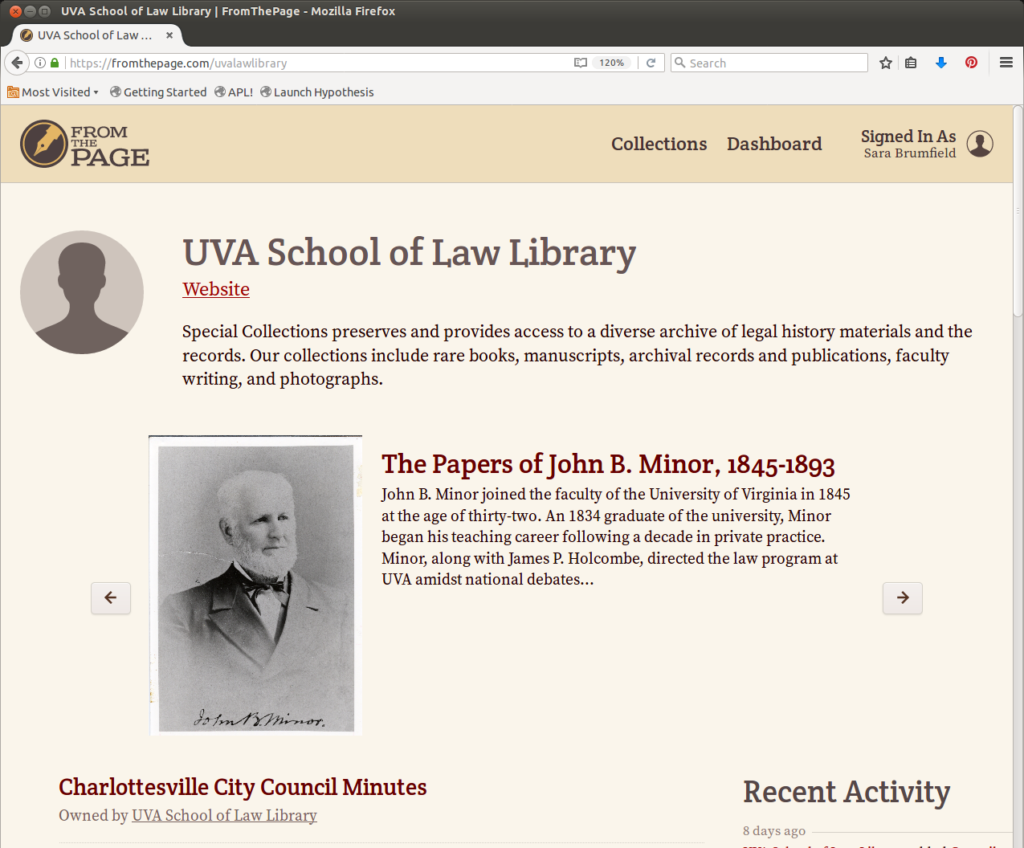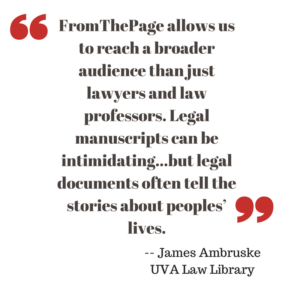Dr. James Ambuske is Horatio and Florence Farmer Postdoctoral Fellow in Digital Humanities at the Arthur J. Morris Law Library, University of Virginia School of Law. We interviewed him to learn more about how a the law school library is using FromThePage with their special collections.
First, tell us about your documents.

The UVA Law Library is fortunate to hold a variety of unique manuscript collections with an emphasis on Anglo-American law, international war crimes tribunals, maritime law, civil practice, and legal education. Our material dates between the 16th and 21st centuries. The documents we've made publicly available on FromThePage represent collections in two main categories: law and society in the early American Republic through the American Civil War, and international criminal and civil law. The Practicing Law in the Early American Republic collection holds a number of case material and other legal documents involving such famous Americans as George Wythe (Thomas Jefferson's professor at the College of William and Mary), James Monroe, and Edmund Randolph. In addition, we have a large number of items from Roger B. Taney's early career as a practicing attorney, long before he joined the Supreme Court and issued his infamous opinion in Dred Scott v. Sandford.

Two of our more fascinating collections include the C.S.S. Alabama Claims Cases, 1870-1876 and the Papers of John B. Minor, 1845-1893. The Alabama was a British-built Confederate naval raider that wrought havoc on Union shipping during the Civil War. After the war, the U.S. Government held its British counterpart liable for damages, and the papers in this collection are from the practice of one attorney, William Crapo (pronounced "Cray-po"), who sought compensation on behalf of his clients. The Minor Papers are from the pen of John B. Minor, one of the most important professors of law at UVA in the 19th century. In addition to an inside look at legal education in the 19th century, Minor's papers also include references to slavery (including, importantly, the names of slaves), viticulture in Virginia, and the Civil War's impact on the University.
Our international material includes an eclectic mix of English, Scottish, Venetian, and East German material. For example, we offer the papers of two English solicitors, J.M. Shugar and A.W. Vaisey, who handled estates in southern England in the late 19th and early 20th centuries. The inventories included in their papers offer a wonderful look at the material culture of peoples' lives in this period. For folks interested in something a little darker and stranger, we included Manuscript List of Persons Condemned to Death in Venice from 726 to 1804. We believe this Italian-language manuscript was compiled circa 1804. It includes the names of the executed, their crimes, and methods of punishment. For lighter fare, The Letter book for the Receiver of Wrecks at Kingston upon Hull, England, 1855-1861 records ships wrecked off the English coast and lobbying efforts by a number of individuals for government jobs in this particular department. Finally, a student in our Digital History Course, Pasuth Thothaveesansuk, created a collection called GDR Living Room Documents based on a seminar course in UVA's Department of History. The documents—all purchased off eBay—represent social life in the German Democratic Republic (GDR) during the Cold War.
What are your goals for the project?
We viewed our subscription to FromThePage as an experimental way to make some of our documents more widely available and engage a public audience. We also envisioned it as a teaching tool in which students in our classes or who work with us as public history interns could gain professional experience transcribing historical manuscripts, marking them up, and thinking about avenues for future research. The GDR Living Documents collection is the most exciting publicly available example of working with students on a FromThePage project. We also have another terrific student developing a new transcription and translation of a 16th century Spanish manuscript, although it is a private scholarly project. Yet, it is a fine example of how graduate students can use FromThePage to advance their dissertation projects.
We also envisioned using FromThePage to improve search functionality within our main archives.law.virginia.edu site. Once we import transcriptions into the site, users will be able to conduct more effective keyword searches.
How are you recruiting or finding volunteers/collaborators?
We've used the Law Library's social media platforms to spread the word about particular collections while working with students to target specific projects. We have also suggested various collections to interested scholars and genealogical organizations.
Can you share your experience using FromThePage?
We've found FromThePage to be a simple, yet powerful, tool for crowdsourcing transcriptions, involving students in documentary editing projects, and promoting the Law Library's work.
How does FromThePage and crowdsourcing fit with law libraries? Are other law library special collections doing projects like this?
FromThePage allows us to reach a broader audience than just lawyers and law professors. Legal manuscripts can be intimidating for a number of reasons—the way that some are traditionally catalogued and indexed or presumptions about their content and value—but legal documents often tell the stories about peoples' lives. Court petitions, depositions, or an attorney's case files contain evidence of women and men appealing to the law in defense of their interests. We can use these documents to understand the social, economic, and political worlds in which these people lived as much as we can the development of the law itself.
Anything else you'd like to tell us?
We've seen great value in using FromThePage thus far and enjoy collaborating with Sara and Ben.
Are you an archive or library that would like to start a transcription project? Start a free trial today.


